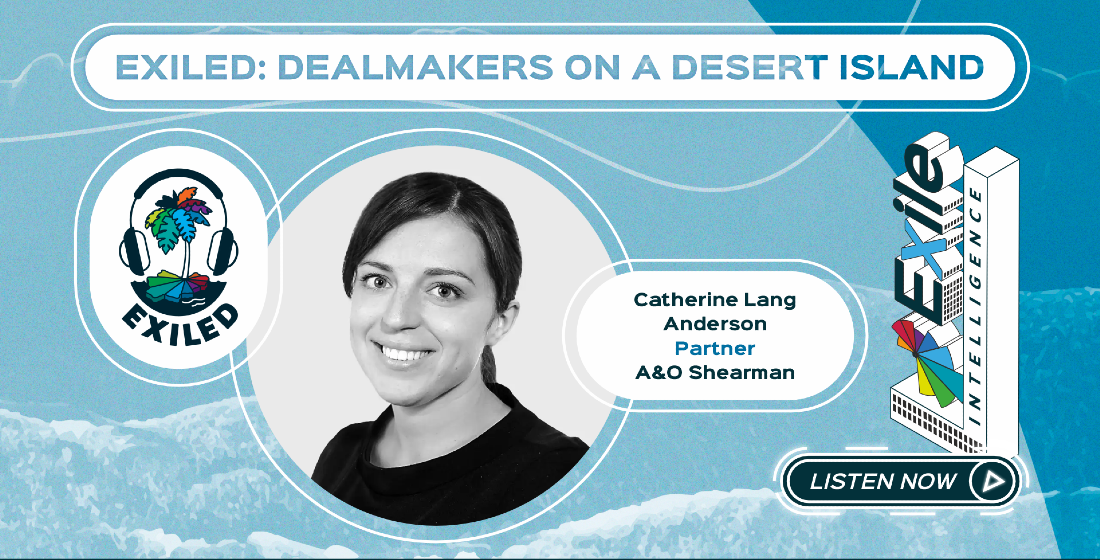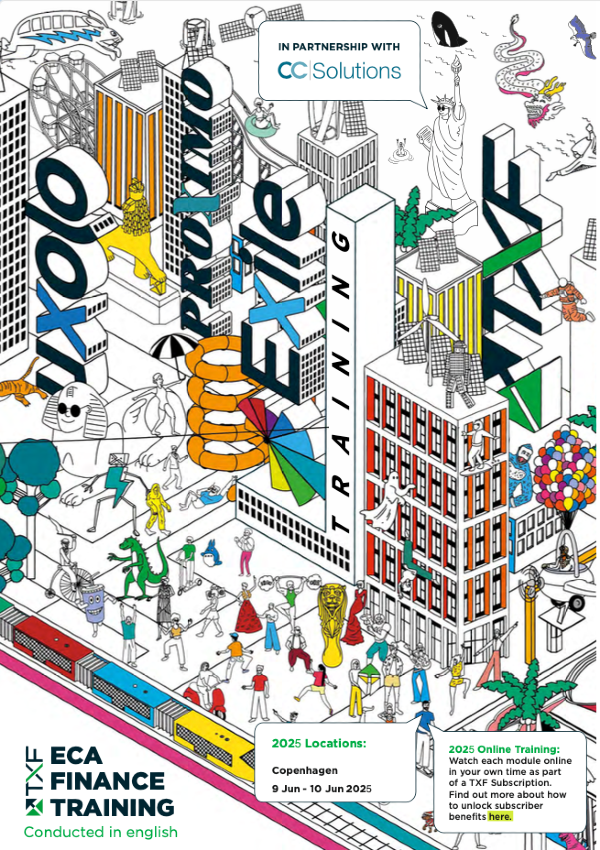Stages for Change: Vanco on bank-investor collaboration
“Why try to compete with a trade finance bank when you can co-invest with them”. In this fortnight’s Stages for Change article, TXF’s Aife Howse speaks to Audentia Global’s Sophia Vanco on why banks and alternative credit managers work better together.

While the commodities industry is evolving with the wider employment sectors to become a more inclusive space, it remains a predominantly male-led business. A study by Catalyst shows that women make up nearly half of the financial services industry, but that less than 13% of women in finance make it to leadership roles such as CFO. Homing in on the commodities industry in particular, women in leadership roles across the world’s largest commodity traders sits at an even slighter fraction of around 5%, according to Bloomberg.
As market observers at TXF, we’re in the privileged position to take a broader look at who is making an impact in the industry, including the exceptionally talented women who are making trade happen. In this series, we highlight a range of female professionals – from junior to senior, representing different types of institutions, each with different drivers to excel in the industry.
Sophia Vanco, head of investor relations at alternative private credit manager Audentia Global, was attracted to her multifaceted role due to the forward facing ‘people’ aspect of the job. With the implementation Basel IV on the horizon, she talks about both the immediate and knock-on effects of increased bank regulation, and how investment innovation can ease the strain on the commodity trade finance industry.
Aife: Can you give us an overview of your role and what Audentia does?
 Sophia: Audentia is an alternative credit manager focused on supporting the commodity trade finance industry. We partner and co-invest with global trade finance banks and major physical trading corporates to help provide short-term credit to finance physical commodity transactions. We set up the business in 2018 to provide a positive response to regulatory reforms that are creating significant challenges for the banking industry, namely Basel III and soon Basel IV.
Sophia: Audentia is an alternative credit manager focused on supporting the commodity trade finance industry. We partner and co-invest with global trade finance banks and major physical trading corporates to help provide short-term credit to finance physical commodity transactions. We set up the business in 2018 to provide a positive response to regulatory reforms that are creating significant challenges for the banking industry, namely Basel III and soon Basel IV.
These changes are having a profound impact on areas of asset-backed lending, such as commodity trade finance, which is our area of specialty. Under Basel III, banks must increase Tier 1 capital and increase their capital adequacy ratios, meaning they have to reduce leverage. The shortfall of capital and financing capacity in the trade finance market because of these regulatory changes has significantly reduced market access to borrowers, leading to a global funding gap.
Putting it simply, banks need capital relief, so if they are to continue to participate in commodity trade finance, they will have to find alternative sources of capital to co-invest with them. Audentia can write bespoke solutions specific to a trade finance bank’s regulatory needs to help reduce their RWA requirements or provide regulatory capital relief, which means the bank can redeploy capital in other yielding opportunities. And of course, like most regulatory change, the disruption isn’t just contained within the banking industry – we’re seeing these changes are also having a knock-on effect to the physical trading corporates in the primary market.
Up to 90% of all global trade relies on some form of bank financing, in a market worth $18 trillion. Now for the first time, experienced, non-bank participants can enter the space, in an area of lending that's existed for hundreds of years and has historically low default rates. For investors, it’s an opportunity to gain exposure to an asset class with a long track record, low volatility and which has little to no correlation to existing markets. To me, it's a hugely interesting and deep investment space, which is ripe for innovation.
I joined Audentia two years ago as head of investor relations, so I'm the point person for our investors. I'm responsible for all investor onboarding, which includes operational due diligence and reporting and I also assist the team in our business development efforts.
Aife: And did you always know that you wanted to do something like this, or did your career path take you in a direction that you didn't really expect?
Sophia: Good question. I never anticipated a career in asset management, or even finance. I began my career, quite accidentally, in energy venture capital, which I was involved in for several years and which taught me a lot about the importance of client service in this industry, before transitioning into alternative asset management about 10 years ago.
I have a degree in Journalism, so I found myself gravitating towards roles that require good communication and diligence, which naturally led me into investor relations and marketing. This can mean different things to different people, but for me it has namely centred on being front of house for institutional investors, supporting sales teams and portfolio managers, while working closely alongside other business areas such as legal, compliance, and operations.
I believe it is a great career path if you are a natural ‘people person’ and can think on your feet. You also have to be astute and diligent, as you constantly keep up to date with what is going on within your own firm and within the wider industry so you can better understand the investor landscape.
Depending on the type of asset manager you work for, it can be a very multifaceted role. The key element is being client focused and understanding your investors. That is particularly important during periods of a downturn or drawdown. Sometimes you have to be prepared to have difficult conversations with your clients. You may also be involved in designing roadshows and events, both domestic and abroad, as well as various other marketing ventures and even PR.
Aife: You’ve mentioned some of the headwinds you face within your role. Are there any concerns that you have for the wider industry at the moment?
Sophia: We are obviously focused on the additional legislative changes of Basel IV. Implementation was expected in January next year, but the disruption of the global pandemic led to it being deferred to January 2023. Basel IV sees the further degradation of the value of collateral and the introduction of an “output floor” which will lead to banks being penalised even more for lending against the types of collateral that form part of commodity trade finance activities.
It is absolutely a concern for the industry, but we feel it strengthens the case for investment innovation and increases the opportunity for a co-investor like Audentia to introduce third party capital to these transactions. This is why Audentia was set up in the first place as we hope to provide a positive and meaningful solution to bank regulatory changes that are here to stay.
I'm also watching the evolution of ESG, both from an investment management standpoint but also as yet another strain on the world of commodities. It is a topic that has been in the background, albeit loudly in the background, for several years, but in my opinion only firmly planted itself into the mainstream last year. This might be off the back of the EU’s green taxonomy and of course the UK government has announced its own framework for determining what activities can be defined as environmentally stable. I think it's going to be problematic for the world of commodities if we consider the energy complex and specifically fossil fuels, because we’re hugely dependent on them. This is not something that we can instantly replace overnight.
There was an article not too long ago in the FT that likened the UK's green taxonomy to the new Basel framework. It’s something to watch and prepare for, and much like the disruption caused by Basel III and IV, we will no doubt see the emergence of innovative solutions to help support the global economy. Banks and other institutions are going to have to adapt to this legislation – it's clearly here to stay.
Aife: A number of factors have contributed to a rise in the cost of bank debt in the commodities sector over the past 18 months. Has this lessened the gap between funds and banks, as they are now on a slightly more level playing field in terms of pricing? Or do you think it has supported Audentia’s position in collaboration with banks?
Sophia: I would look at it this way. It’s not about the rising cost of bank debt and whether alternative lenders can be competitive on the pricing front. For me, this is more about the impact of Basel IV. Because banks, or in our case specifically, trade finance banks, may have no choice but to partner with alternative credit providers because it won’t be economical for them to continue to lend to the physical trading community. And alternative financing may be on the up, but when we look at the impact of their lending compared to the impact of this regulatory change, it is minimal.
Not just that, but a trade finance fund could never compete with the operational infrastructure that these huge global banks have. This is one of the reasons why we set up Audentia as an alternative partner to the banks: why try to compete with a trade finance bank when you can co-invest with them, create bespoke solutions to reduce their RWA requirements and provide regulatory capital relief and help the bank to continue to provide financing to facilitate global trade.
Taking this one step further, funds are outside the banking system and in our experience, this means they are extremely limited in their origination pipeline, limited in their capacity in terms of AuM, and they are limited in their overall lending capacity where there is an ever-increasing demand for trade finance facilities.
We would argue that alternative credit funds with a focus, like Audentia, are going to be the only real, workable solution. It means banks can continue to maintain their financing relationships and operations in a commercially viable way by co-investing with the fund, which brings down the bank’s overall cost of capital to a manageable level. This model allows banks to stave off the major impacts of regulatory change.
And maybe as a final point, you also have to consider expertise. Commodity trade finance can’t be done by just anyone – it is a specialist area that requires a specialist knowledge and skillset. I know there are trade finance funds out there that are run by ex-financiers, brokers, who have no experience trading physical, at all. We purpose-built Audentia to cover all facets of physical commodity trading, which we would say centres on physical trading experience, derivative risk management expertise and financial structuring expertise. These skills are crucial for risk management because if you don’t have experience trading the actual physical underlying, how are you truly going to understand any potential transactional risk? From an investor standpoint, this is just so important.
The funding gap is only going to increase under Basel IV, so we have to find alternative ways to finance trade. And we want trade finance banks to continue to lend because trade finance ultimately underpins the global economy.
Aife: Audentia works to bridge the trade finance gap, but a lot happened in the past year to widen the gap further. Has your organisation made any changes to adapt to this?
Sophia: When we founded Audentia, we were very much focused on providing bespoke solutions specific to a trade finance bank’s regulatory requirements. But as we started to grow, we quickly understood that these lending constraints aren’t only affecting the trade finance banks in the secondary market. They are also having a knock-on effect to the major physical trading corporates in the primary market because banks are scaling back their lending in response to leverage and capital constraints.
As an example, within the world of energy commodities, we’re seeing the majors, who for years have relied on bank funding, being turned away. Major corporates are now seeking specialist co-investors. Our partnerships have expanded to include working with majors to help them bring down their average cost of capital. It was a segment that we couldn't ignore because ultimately we're here to support the whole trade finance industry.
Aife: What advice would you give to someone who is looking to get into investor relations in the trade finance sector?
Sophia: Generally, if you're considering a career in investor relations within asset management, you have to be willing and prepared to interact and communicate clearly with not just investors, but your colleagues and peers – a lot of what I do involves closely working alongside compliance and legal, operations and, of course, portfolio managers and c-suite management.
An ability to adapt quickly is handy, particularly if you're working for a large asset manager where you might cover multiple strategies at one time. You definitely need to make the effort to understand your portfolio managers and their investment philosophy and processes. At times you’ll have to get you head around more sophisticated or lesser-understood investment opportunities and be able to disseminate those ideas competently and accurately to investors.
I’m lucky to have worked for some fantastic asset managers headquartered both in the UK and the US, with satellite offices around the world. I believe having that exposure to different regions has given me a better appreciation of how different cultures work, and I have had the pleasure of getting to know a really diverse group of people. I think if I hadn't had this breadth of diversity across my career, I wouldn't have gotten to where I am today.





